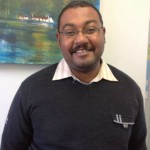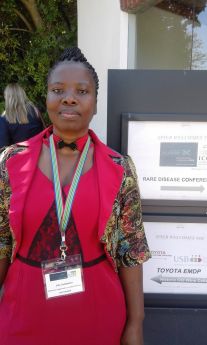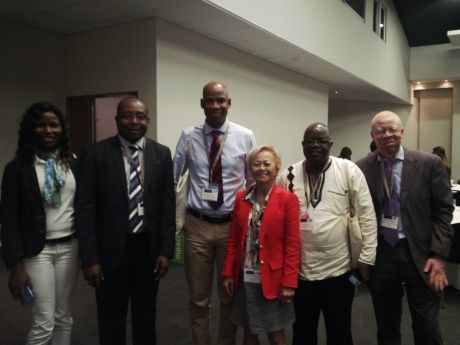2016
During 2016 the Association has supported Dr Aimee Donald, Paediatric Clinical Research Fellow at Manchester Centre for Genomic Medicine to attend the WORLD Symposium present her work on neuronopathic Gaucher Disease; Dr Elad Shamesh an Israeli medical doctor and a member of the Cochrane Collaborations Genetic disorders group to attend and present at the prestigious Cochrane collaboration conference in Seoul and a Gaucher Masterclass in South Africa
 Aimee Donald writes: The WORLD Symposium is a conference which brings together clinicians and scientists from all over the world to learn and share knowledge on rare diseases involving lysosomes. This year the symposium was held in San Diego and I was fortunate enough to attend and share my work on neuronopathic Gaucher Disease with the generous support of the UK Gaucher Association.
Aimee Donald writes: The WORLD Symposium is a conference which brings together clinicians and scientists from all over the world to learn and share knowledge on rare diseases involving lysosomes. This year the symposium was held in San Diego and I was fortunate enough to attend and share my work on neuronopathic Gaucher Disease with the generous support of the UK Gaucher Association.
I currently work as the Paediatric Clinical Research Fellow with Gaucherite, a study which many of you will have been invited to participate in. Gaucherite is a study looking to understand more about how Gaucher Disease affects patients in the UK so that in the future we can develop more targeted and specific treatments for each patient as an individual. I am particularly interested in patients who have neuronopathic Gaucher disease and so I undertook a small piece of work examining the disease experience of a group of children and young adults who have sadly died as a result of the disease over the last ten years. Fortunately, not many patients have died during this period, however that means that generalisations about the disease can’t be made on the basis of information gathered on such a small group. Reviewing their case-notes however highlighted the timing of disease progression for each patient; I can now use this information to investigate some of these findings in more detail. Also, by presenting this work at an international meeting, I was able to discuss our experience in the UK with doctors from other parts of the world who in some cases had similar experiences. By collaborating in our research we will learn a lot more about the disease and hopefully be able to generate new approaches to treatment in the future.
While at the conference I learnt more about the underlying scientific basis of treatment for Gaucher disease and also had the opportunity to learn about other lysosomal storage disorders which may inform our understanding of Gaucher Disease. I had a wonderful trip and would like to thank the Gaucher Association for enabling me to attend.
 Dr Elad Shamesh writes – ‘The Cochrane collaboration is a multinational nonprofit organization of clinicians, statisticians and healthcare consumers working together to systematically review clinical trials in order to consolidate conclusions, mainly regarding efficacy and safety of drugs. These conclusions are then disseminated to inform healthcare professionals and patients about clinical effects of different treatment options. Briefly, the term ‘Systematic review’ refers to a complex mathematical procedure in which data from published studies are re-evaluated and compared from a new statistical viewpoint, alongside an assessment of possible biases in those studies (such process is generally named ‘evidence-based medicine’). While the conduct of systematic reviews is now considered critical in consolidation of recommendations and guidelines of treatments in most of the common medical conditions, its use in rare disease has been limited.
Dr Elad Shamesh writes – ‘The Cochrane collaboration is a multinational nonprofit organization of clinicians, statisticians and healthcare consumers working together to systematically review clinical trials in order to consolidate conclusions, mainly regarding efficacy and safety of drugs. These conclusions are then disseminated to inform healthcare professionals and patients about clinical effects of different treatment options. Briefly, the term ‘Systematic review’ refers to a complex mathematical procedure in which data from published studies are re-evaluated and compared from a new statistical viewpoint, alongside an assessment of possible biases in those studies (such process is generally named ‘evidence-based medicine’). While the conduct of systematic reviews is now considered critical in consolidation of recommendations and guidelines of treatments in most of the common medical conditions, its use in rare disease has been limited.
In 2015, in collaboration with a group of experts in Gaucher disease - Professor Timothy Cox (Cambridge University), Dr. Patrick Deegan (Cambridge University), Professor Carla Hollak (Amsterdam medical centre), Professor Neil Weinreb (Florida, USA), Professor Bruno Bembi and Dr. Laura Deroma (Udine, Italy), we published a systematic review on the treatment options for Gaucher disease. We have been working on two exciting follow-ups since then: An update of our analysis to include the two new eliglustat clinical trials that have recently been published- in order to inform the National health care system committee prior to publication of guidelines regarding its use (this update is expected to be completed and published in early 2017), and, on a set of suggestions regarding how treatment options in rare diseases should effectively be measured and how to enhance the applicability of systematic reviews in rare conditions.
Through the generous support of the UK Gaucher association via the Susan Lewis Memorial fund, I was able to attend this year’s Cochrane collaboration conference (held in Seoul, October 2016) and share our ideas. My participation in the conference has also granted me the opportunity to learn new research techniques and to appreciate future trends in evidence-based medicine.
I would like to thank the UK Gaucher association for their commitment and continuous support in our research projects.
Gaucher Masterclass in South Africa
On Tuesday 17th October, Tanya Colin-Histed of the EGA, Prof Chris Hendriksz, Dr Greg Pastores and Dr Hylton Sevitz ran a MASTERCLASS in Cape Town South Africa. This was joint venture between the EGA and the UK Gauchers Association who provided funding through the Susan Lewis Memorial Fund to support many of the attending doctors.
Tanya writes; The Gaucher Masterclass attracted physicians from all over Africa including Cameroon, Botswana, Sudan, Rwanda, Malawi, South Africa and Zimbabwe. Rare Disease Botswana were also represented by their cofounder and mother of two children with a rare disease and Aimee-Kate Bosch, a Gaucher patient and a member of the Gaucher and LSD Society of South Africa.
The idea for this masterclass came from a) the EGA’s work in educating doctors and b) following several applications to the EGA from several different countries in Africa for help in getting access to ERT through charitable access programmes as Governments in these countries do not provide the treatment through public health programmes, although a few patients in South Africa are now receiving ERT from the Government, these are in the minority. As these doctors are only treating one or two patients it is important to a) improve their knowledge of the disease for diagnosis and clinical management and b) to develop a sustainable network for ongoing support and guidance.
Prof Chris Hendriksz led the masterclass and donated his time to develop the programme and identify the speakers. Chris, a doctor from one of the LSD treatment centers in the UK, South African born and his wife Flo have set up a company that are making educational videos to support the development of knowledge and clinical practice guidance for metabolic conditions and they videoed the masterclass to provide ongoing tutorials for the participants that they can tap back into.
The day focused on areas such as an overview of the disease and its pathology, highlighting its clinical signs and symptoms, a description of the different sub groups of the disease and the challenges of diagnosis. One of the morning sessions led by Dr Karen Fieggen who highlighted the challenges of diagnosis in an environment where many children and adults had other clinical/health challenges such as TB, HIV and malnutrition. Topics such as co morbidities, the use of biomarkers and different types of therapeutic options were discussed, often with lots of questions during the sessions which stimulated a lot of very valuable input and awareness of local challenges.
In the afternoon, the focus was on supporting the patients and families, the development and sharing of clinical guidelines and the importance of building networks in countries. I finished the day with a presentation of the value of working with the patient organization outlining my story as a mother, which is often at the heart of many rare disease patient groups, the work of the UK Gauchers Association as an example of how to support patients and their families and then the strategic role of the EGA.
The Feedback from the masterclass has been very positive, both on the day and through the feedback forms we have received back from the participants.
The Susan Lewis Memorial Award provided bursaries for a number of doctors to attend this meeting please read their reports below:
 Ayman A. Hussein writes ‘Thank you for sponsoring my attendance at the 2016 Gaucher Masterclass held in Cape Town, South Africa. My name is Ayman Hussein, I am from Sudan, and I am a medical doctor and a registrar in training in Medical Genetics at the University of Cape Town. I found the course very useful not only because of the excellent content in the presentations but also because of the opportunity to meet and interact with other course attendees and the organizers. As well as being a useful update on the science and clinical management of Gaucher, it was an opportunity to learn more widely around practical considerations and social, ethical and legal issues that are relevant to it’.
Ayman A. Hussein writes ‘Thank you for sponsoring my attendance at the 2016 Gaucher Masterclass held in Cape Town, South Africa. My name is Ayman Hussein, I am from Sudan, and I am a medical doctor and a registrar in training in Medical Genetics at the University of Cape Town. I found the course very useful not only because of the excellent content in the presentations but also because of the opportunity to meet and interact with other course attendees and the organizers. As well as being a useful update on the science and clinical management of Gaucher, it was an opportunity to learn more widely around practical considerations and social, ethical and legal issues that are relevant to it’.
 Eda Selebatso writes ‘My name is Eda Selebatso. I am a mother of two children with rare conditions. I Co-founded the Botswana Organisation for Rare Diseases (BORDIS) with my husband in 2015. I am the chairperson of BORDIS. To meet the demands of leading BORDIS I have to pursue personal development in areas that address the needs of rare disease patients. That includes knowing about conditions which is why I was very interested in this class. I got invaluable networks and information which I immediately used when I got back home. I already have been in touch with Prof Hendricksz on some of our patients to find better ways to proceed and that has been wonderful. I also now have doctors with some ideas on management and know where to refer their patients. This for us in Botswana is hope that tomorrow can only be better’.
Eda Selebatso writes ‘My name is Eda Selebatso. I am a mother of two children with rare conditions. I Co-founded the Botswana Organisation for Rare Diseases (BORDIS) with my husband in 2015. I am the chairperson of BORDIS. To meet the demands of leading BORDIS I have to pursue personal development in areas that address the needs of rare disease patients. That includes knowing about conditions which is why I was very interested in this class. I got invaluable networks and information which I immediately used when I got back home. I already have been in touch with Prof Hendricksz on some of our patients to find better ways to proceed and that has been wonderful. I also now have doctors with some ideas on management and know where to refer their patients. This for us in Botswana is hope that tomorrow can only be better’.
 Dr Dipesalema Joel writes ‘I am Dr Dipesalema Joel, a Consultant Paediatric Endocrinologist practicing at Princess Marina Hospital in Gaborone, Botswana. I am also a Senior Lecturer in the Department of Paediatrics and adolescent Health at the University of Botswana. Throughout my career ranging over a period of 14 years, I have worked with patients with rare diseases, in-born error of metabolism and endocrine disorders. As a clinician in Princess Marina Hospital which is the main tertiary referral centre for Botswana, I work with these groups of patients on day today basis. As such it was quite resourceful for the European Gaucher Association to sponsor me to attend the Gaucher Master Class.
Dr Dipesalema Joel writes ‘I am Dr Dipesalema Joel, a Consultant Paediatric Endocrinologist practicing at Princess Marina Hospital in Gaborone, Botswana. I am also a Senior Lecturer in the Department of Paediatrics and adolescent Health at the University of Botswana. Throughout my career ranging over a period of 14 years, I have worked with patients with rare diseases, in-born error of metabolism and endocrine disorders. As a clinician in Princess Marina Hospital which is the main tertiary referral centre for Botswana, I work with these groups of patients on day today basis. As such it was quite resourceful for the European Gaucher Association to sponsor me to attend the Gaucher Master Class.
The Gaucher Master Classes were quite resourceful to me as I learned from the experts in the area as well as patients who lived with this disorder.I learned how to look after patients with Gaucher’s disease. I would highly recommend this workshop for anybody who works with patients with rare diseases and I will certainly attend it again’.
Further Doctors who were funded by the Susan Lewis Memorial Award were Monkgogi Goepamang, Farai GW Chinhoyi from Botswana; Tapiwanashe Bwakura from Zimbabwe and Cedrik Ngongang from Cameroon.
